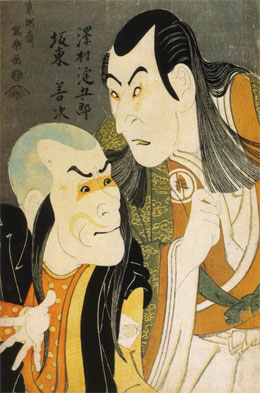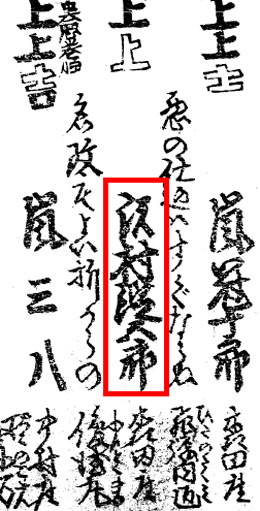| SAWAMURA YODOGORď |
| FOUR GENERATIONS | |||||
| Sawamura Yodogor˘ I | |||||
|
The actor Sawamura Otoemon II held the name of Sawamura Yodogor˘ I from the 11th lunar month of 1738 to the end of the 1730s or the beginning of the 1740s. |
|||||
| Sawamura Yodogor˘ 1.2 Sawamura Yodogor˘ |
|||||
|
An almost unknown actor held the name of Sawamura Yodogor˘ in 1758 and 1759. |
|||||
| Sawamura Yodogor˘ II Sawamura Yodogor˘ II |
|||||
|
Dates of birth and death unknown. Son of Sawamura Otoemon II, he received the name of Sawamura Kikuji and made his debut on stage (hatsubutai) in the 11th lunar month of 1759, performing at the Nakamuraza in the kaomise drama "Sh˘gaichi Kaomise Matsuri". He became a disciple of Sawamura S˘jűr˘ II in 1766 and took the name of Sawamura Yodogor˘ II in the 11th lunar month of 1766 at the Moritaza, playing the role of Sanada Yoichi in the kaomise drama "Tsuno Moji Izu no Irifune", which also celebrated the shűmei of Band˘ Mitsugor˘ I and Ichikawa Somegor˘. He became jitsuaku in the 11th lunar month of 1778, performing at the Moritaza in the kaomise drama "Date Nishiki Tsui no Yumitori". He was active in Edo for more than 40 years and his last-recorded performance occurred in the 9th lunar month of 1800, when he played at the Ichimuraza the role of Haji no Hy˘e in the drama "Sugawara Denju Tenarai Kagami". His ranking in the 1801 Edo hy˘banki, jitsuaku section, was one white stroke below j˘-j˘-(shiro)hankichi [visual].
|
|||||
 |
|||||
|
The actors Band˘ Zenji I and Sawamura Yodogor˘ II playing the roles of Onisadob˘ and Kawazura H˘gen in the "Shi-no-Kiri" scene of the play "Yoshitsune Senbon Zakura", which was staged in the 5th lunar month of 1794 at the Kawarasakiza (print made by T˘shűsai Sharaku) |
|||||
| Sawamura Yodogor˘ 2.3 Sawamura Yodogor˘ |
|||||
|
Dates of birth and death unknown. The first stage name of this katakiyaku actor was Band˘ Bunz˘ but his relationship to the Band˘ clan was not known. His first-recorded performance occurred in the 11th lunar month of 1805 in Edo at the Moritaza. He took the name of Sawamura Yodogor˘ in the 11th lunar month of 1808 at the Moritaza. He was active up to 1817 and his last-recorded performance was in Ise at the Furuichi Shibai. No record afterwards. |
|||||
 |
|||||
|
The name of Sawamura Yodogor˘ in the 1809 Edo hy˘banki (the zone within the red box) |
|||||
| Sawamura Yodogor˘ III Sawamura Rensha IV |
|||||
|
Born in 1853. He became a disciple of Sawamura Tossh˘ II and received the name of Sawamura Kimihei I in 1867. He took the name of Sawamura Yodogor˘ III in 1877 in T˘ky˘ koshibai. In September 1911 at the Imperial Theater, Sawamura Yodogor˘ III and his son Sawamura Kimihei II became both nadai and took respectively the names of Sawamura Rensha IV and Sawamura Yodogor˘ IV. No record for Sawamura Rensha I, Sawamura Rensha II or Sawamura Rensha III. Rensha was the haimy˘ of Sawamura Yodogor˘ II. Sawamura Rensha IV died the 15th of February 1931.
|
|||||
| Sawamura Yodogor˘ IV Sawamura Yodogor˘ IV |
|||||
|
Born in 1893. Son of Sawamura Yodogor˘ III and disciple of Sawamura S˘jűr˘ VII, he started his career around 1903, performing under the name of Sawamura Kimihei II. In September 1911 at the Imperial Theater, Sawamura Kimihei II and his father Sawamura Yodogor˘ III became both nadai and took respectively the names of Sawamura Yodogor˘ IV and Sawamura Rensha IV. No record after 1936. Day of death unknown.
|
|||||
|
|
| Contact | Main | Top | Updates | Actors | Plays | Playwrights | Programs | Links | FAQ | Glossary | Chronology | Illustrations | Prints | Characters | Derivatives | Theaters | Coming soon | News |